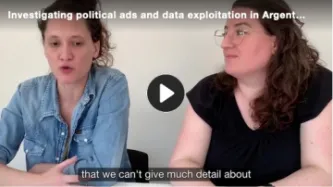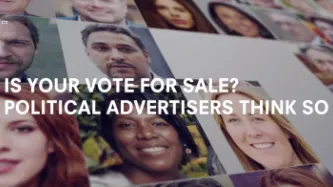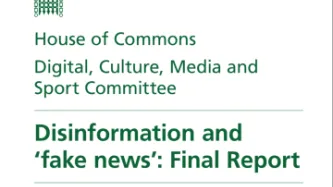Search
Content type: Video
The incorporation of new technologies to electoral processes is a phenomenon with a global and exponential growth. Despite its benefits, online campaigning is not without challenges, and can pose threats to transparency and equity in electoral competition. Given the role of elections as foundational pillars of the democratic system and a key gateway for the exercise of fundamental civil rights, these implications must be assessed with care and through specific tools.
We at PI, together…
Content type: Press release
Privacy International, Open Rights Group, the Institute for Strategic Dialogue, Fair Vote, Who Targets Me? and Demos have today written to all the main UK political parties, demanding that they are transparent with the public about how they are using voters’ personal data in their electioneering. Twitter's announcement yesterday of their ban on political advertising is just the latest wake up call to politicians about the risks to democracy of personal data driven microtargeting of political…
Content type: Long Read
The UK public, regulators, and parliamentarians have all expressed concern about the wide use of third-party data by all political parties in the UK and its impact on privacy and democracy. In the week the remaining six candidates to be the UK’s next Prime Minister are reduced to two, Privacy International takes a look at their privacy policies to illustrate how such policies can be used to identify the use of third-party data by political candidates from all political parties.
The…
Content type: News & Analysis
The first half of 2018 saw two major privacy moments: in March, the Facebook/ Cambridge Analytica scandal broke, followed in May by the EU General Data Protection Regulation ("GDPR") taking effect. The Cambridge Analytica scandal, as it has become known, grabbed the attention and outrage of the media, the public, parliamentarians and regulators around the world - demonstrating that yes, people do care about violations of their privacy and abuse of power. This scandal has been one of…
Content type: Advocacy
In December 2018, PI responded to the UK Information Commissioner's (ICO) Call for Views on a Code of Practice for the use of personal information in political campaigns.
The consultation followed on from the ICO's policy report Democracy Disrupted?, published in July 2018, which recommended that the Government should legislate at the earliest opportunity to introduce a statutory Code of Practice under the Data Protection Act 2018 for the use of personal information in campaigns.…
Content type: News & Analysis
This piece was first published in GDPR today in March 2019.
Elections, referendums and political campaigns around the world are becoming ever more sophisticated data operations. This raises questions about the political use and abuse of personal data. With the European Union elections fast approaching and numerous national and local elections taking place across EU Member States, it is essential that the legal frameworks intended to protect our personal data do just that.
Member State…
Content type: Examples
On January 9, 2019 the UK Information Commissioner's Office fined SCL Elections, also known as Cambridge Analytica, £15,000 for failure to comply with an enforcement notice the ICO issued in May 2018 ordering the company to respond in full to a subject access request submitted by US-based academic David Carroll. The company was also required to pay £6,000 in costs and a victim surcharge of £170. Information Commissioner Elizabeth Denham noted that UK data protection laws apply to all data…
Content type: Examples
The results of a year-long review issued by the UK Information Commissioner's Office in November 2018 uncovered a "disturbing disregard for voters' personal privacy" on the part of 30 organisations, including social media platforms, political parties, data brokers, and credit reference agencies. Based on information uncovered during the investigation, the ICO sent 11 warning letters requiring action by the main political parties, and announced its intention to conduct audits; issued an…
Content type: Examples
In 2019, a prominent page on the Facebook Business site cited the British Conservative Party as a "success story" at the 2015 general election, which put the party into power with a narrow majority. The site boasted that via Facebook the Conservatives had an 80.6% reach in key constituencies, 3.5 million video views, and a social context for 86.9% of all the ads served - and that as a result the party had defied the polls and achieved an outright majority.
https://en-gb.facebook.com/business/…
Content type: Examples
In November 2018, the UK government announced that 11 local authorities across England would participate in Voter ID pilots in the interest of gaining "further insight into how best to ensure the security of the voting process and reduce the risk of voter fraud". Five local authorities participated in pilots in the 2017 general election. The new pilots will test four models of identification checks: photo ID (Pendle, East Staffordshire, Woking), photo and non-photo ID (Ribble Valley, Broxtowe,…
Content type: News & Analysis
Privacy International welcomes the focus on data and privacy contained in the final report by the UK House of Commons Digital, Culture, Media and Sport Committee (DCMS) on Disinformation and ‘fake news’. Beyond our control, companies and political parties have banded together to exploit our data. This report establishes essential steps to remedying this downward spiral. An important part of the democratic process is freedom of expression and right to political participation, including the right…
Content type: Examples
A flaw in the official 2018 UK Conservative Party conference app granted both read and write access to the private data of senior party members, including cabinet ministers, to anyone who logged in by second-guessing the email address they used to sign into the app. Twitter users claimed that one leading politician, Boris Johnson, had his avatar briefly replaced by a pornographic image, while another, Michael Gove, had his replaced by that of media magnate Rupert Murdoch. The app was…
Content type: Examples
In November 2018, the UK government announced it would pilot voter ID for in 11 local authorities during thte 2019 local elections in order to gain insight into ensuring voting security and lowering the risk of voter fraud. The Cabinet Office deemed the pilots conducted in five local authorities during the 2018 local elections to be a success. Four models of checking are under consideration: photo ID (Pendle, East Staffordshire, Woking); one photo or up to two non-photo IDs (Ribble Valley,…
Content type: Examples
In 2018, after the UK Cabinet Office said a trial of compulsory voter ID was necessary because reports of voter fraud had more than doubled between the 2014 and 2016 elections - a claim immediately disputed by a voter and upheld by the UK Statistics Authority. While it was true that there were 21 reports in 2014 and 44 in 2016, the number fell to 28 in 2017, small numbers to begin with. Crucially, more than twice as many people voted in 2016, the year of the EU referendum. None of the five…
Content type: Examples
In October 2018, in the wake of the Cambridge Analytica scandal and questions over Facebook's influence on the UK's EU referendum, Facebook announced it would add Britain to the US and Brazil on the list of countries where the company will no longer allow political groups to publish "dark" ads on its network. Among the changes: all paid-for political content will be automatically published in a public library for up to seven years; individuals and organisations running ads with political…
Content type: Long Read
Yesterday the UK's Information Commissioner's Office (ICO) - which is responsible for ensuring people's personal data is protected - announced it intends to fine Facebook the maximum amount possible for its role in the Cambridge Analytica scandal.
This decision highlights of how serious and rampant misuse and exploitation of data is. Facebook is responsible and failed to comply with data protection 101: be upfront and honest about what you are doing with people's data.
Importantly, the ICO's…
Content type: Examples
After investigation, the UK's privacy regulatory, the Information Commissioner's Office has found that two small sections of the written scripts used by Blue Telecoms, a marketing firm that made calls on behalf of the Conservative Party during the 2017 general election, crossed the line from legitimate market research to unlawful direct marketing. The ICO has issued a warning to the Conservative Party rather than launching a formal regulatory action because, it says, the overall campaign was…
Content type: Examples
Facebook and Twitter have advised Damian Collins, the chair of the UK Parliament's digital, culture, media, and sport committee, that the companies will hand over some information relating to the rearch of Russia-backed posts during the EU referendum. Facebook has already given the US Senate similar information about Russia-backed posts during the 2016 presidential election; this information showed that campaign ads and fake news generated by the Internet Research Agency troll factory in St…
Content type: Long Read
In December 2017, Privacy International published an investigation into the use of data and microtargeting during the 2017 Kenyan elections. Cambridge Analytica was one of the companies that featured as part of our investigation.
Due to the recent reporting on Cambridge Analytica and Facebook, we have seen renewed interest in this issue and our investigation. Recently in March of 2018, Channel 4 News featured a report on micro targeting during the 2017 Kenyan Presidential Elections, and the…
Content type: Long Read
Disclaimer: This piece was written in April 2017. Since publishing, further information has come out about Cambridge Analytica and the company's involvement in elections.
Recently, the data mining firm Cambridge Analytica has been the centre of tons of debate around the use of profiling and micro-targeting in political elections. We’ve written this analysis to explain what it all means, and the consequences of becoming predictable to companies and political campaigns.
What does…
Content type: News & Analysis
If you were to buy ‘Anna Karenina’ online, you would be told that people who bought Tolstoy’s classic also bought Dostoevsky’s ‘Crime and Punishment’. But if you've just read an 848 page epic Russian novel, do you really want your follow up to be a 1,008 page epic Russian novel? Maybe you want to read something very different next, maybe some contemporary American short stories, such as ’No one belongs here more than you’ by Miranda July? But you know, I don't think the…



















